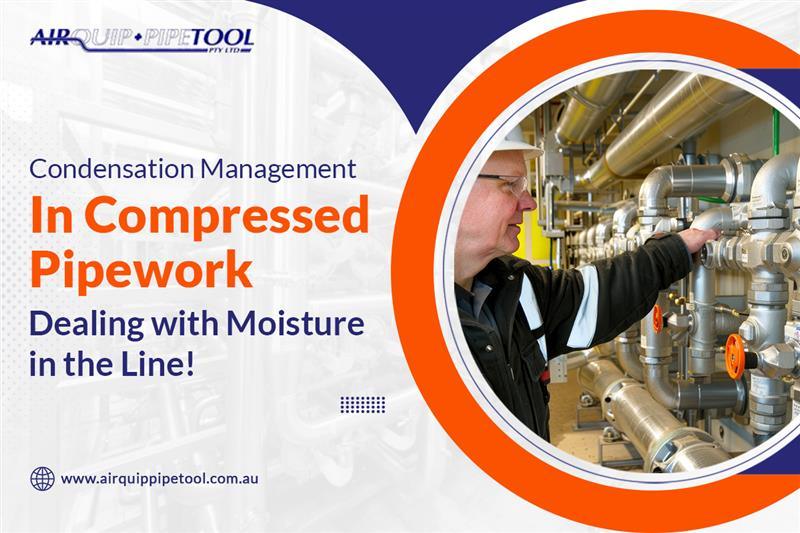- by airquippipetool
- . 12 Jan 2026
How Loop Systems Help Reduce Noise in Large-Scale Compressed Air Pipework?
The materials used in coolant disposal pipework are the main factor. So, industries need to understand what material- HDPE, Aluminium, or Stainless Steel (316L) works best for their conditions.
Airquip & Pipetool Pty Ltd brings real value with decades of experience in designing and installing compressed air pipework and fluid handling systems that are durable, compliant, and tailored for each application.
The right pipe material determines the long-term reliability, environmental compliance, and operational safety.
The Common Risks To Expect
Unsuitable materials when used in industrial pipework can result in corrosion, leakage, and pressure loss. These issues not only increase maintenance costs but can also contaminate coolants and surrounding areas, leading to potential environmental breaches. A mismatched material may also degrade faster under high temperatures or chemical exposure, shortening the system’s lifespan and reducing performance.
Sustainable Advantages Of Correct Pipework material
The correct material ensures consistent flow, durability, and system integrity. The right pipe resists chemical reactions, maintains stable pressure across varying loads, and prevents contamination of fluids. It also reduces downtime and repair expenses, while supporting sustainability through longer service life and reduced waste.
High-Density Polyethene, or HDPE, remains one of the most versatile options for used coolant disposal systems. HDPE performs particularly well in systems exposed to various coolants or lubricants and maintains integrity even under prolonged chemical contact.
Because it is easy to install and cost-effective, HDPE has been widely adopted across Adelaide’s industrial facilities. However, its performance is best suited for moderate temperatures and lower-pressure environments.
Over the past decade, Aluminium has become the preferred choice for modern industrial systems. Its lightweight nature and excellent corrosion resistance make it ideal for environments that require both efficiency and a professional finish. For industries handling coolant lines or compressed air, Aluminium’s smooth internal surface reduces friction losses, improving energy efficiency and flow stability.
When installed as part of compressed air pipework or fluid reticulation systems, Aluminium also offers a clean, aesthetic look that aligns with the high standards required in food, pharmaceutical, or precision manufacturing setups.
Airquip & Pipetool’s experience in designing and installing Aluminium systems ensures each installation meets both performance and safety standards. Combined with expert services such as air compressor pipe fittings service Adelaide, Aluminium systems can deliver decades of consistent operation with minimal maintenance.
For facilities that demand the highest levels of hygiene, temperature tolerance, and strength, Stainless Steel (316L) stands unmatched. This material resists corrosion, scaling, and bacterial growth, making it essential for food and beverage, chemical, and heavy industrial operations.
In used coolant disposal systems, Stainless Steel performs exceptionally under high pressure and temperature variations. Its rigidity ensures long service life, even in harsh or outdoor environments. While it requires a higher initial investment compared to HDPE or Aluminium, the long-term savings from reduced downtime, maintenance, and replacements often justify the cost. The result is a system that not only performs better but also supports sustainability by reducing material waste over time.
So, if you are looking for something more convenient and worthy, it is recommended to opt for Aluminium. Although each option — HDPE, Aluminium, or Stainless Steel — brings its own strengths, the best results come from pairing the right material with expert design and installation.
With decades of experience in air compressor pipe fittings service Adelaide, Airquip & Pipetool Pty Ltd continues to lead the industry by providing tailored, long-lasting solutions that prioritise efficiency, safety, and sustainability. From fluid handling to compressed air reticulation, their systems are built to perform — today and for the future.
 " alt="">
" alt="">How Loop Systems Help Reduce Noise in Large-Scale Compressed Air Pipework?
 " alt="">
" alt="">Condensation Management With Compressed Pipework: Dealing With Moisture in the Line!
 " alt="">
" alt="">Pressure Drop In Compressed Air Reticulation Systems: Causes, Consequences & How to Minimise It?

Noise inside industrial facilities is a technical indicator of inefficiency, pressure instability, and excessive energy loss. When pressure drops inside your compressed air pipework, the system compensates by accelerating airflow, […]

Condensation occurs when moisture in compressed air cools and turns into liquid after compression. When left unchecked, it travels through the system and can damage tools, machinery, and air-dependent equipment. […]

An efficient industrial air network is about ensuring steady pressure, minimal energy loss and reliable performance from the first compressor discharge to the tool on the line. With well-designed compressed […]
Copyright © 2026 airquippipetool | All rights reserved